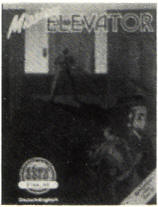Eurogold/Starline 
Distributed by Ariolasoft
£19.99
Foreign secret agents have hidden a time bomb in a big hotel. The
bomb is hidden somewhere on the sixty second floor. It is your job,
playing the part of agent Trevor, to enter the building on the
ground floor and work your way up, collecting clues and hints to
crack the code.
I have a feeling that this is similar to the arcade game 'Elevator
Action', which was popular in America but rarely seen in this
country. The game is, however, very playable and quite addictive.
The screen layout is similar to most platform games, with various
floors above you with enemy agents roaming about dressed in long
black raincoats and their wide brimmed hats. Between the floors are
elevators, which must be used to reach higher floors. On each floor
of the hotel there are various doors which can be opened with the
key from reception, and other things such as clocks, tables, plants
or statues.
The various doors each have someone behind them, be it an enemy
agent or a punk rocker! Appropriate digitized sounds accompany some
people as they appear at the doorway, for example, when the Nun
answers the door, she is accompanied by a church organ! Behind one
of the doors you should find the porter who will give you the
emergency door key. The hotel is split into eight levels each
containing eight floors, and to move onto the following level you
must go through the emergency door, using the key obtained from the
porter.
The whole game appears quite simple at first, but if you set out to
retrieve all of the hints and tips it can become quite complex.
Having a notebook handy might be necessary as you get more involved
with it. You can obtain hints from various places throughout the
game. My favourite is in the bar, where if you buy the correct drink
from the barkeeper, he will give you part of the secret code,
however you become drunk and the game's controls are reversed. If
you try to do any more than move, you are informed that "you are
shtill drunk"!
My only dislike of the game is the `computer printout' which slowly
comes up on the screen informing you that you have failed. It then
clears the screen and prints another message. This becomes very
tedious after a few times, and there is no way of skipping the
section. If you get to a point where you have suddenly worked out
how to do something and you are then killed off before being able to
do so, you normally want to go straight back to the game. You
probably won't want to hang around for some silly cosmetic feature
to repeat itself yet again.
Other than this minor quibble there is nothing else I can say
against the game. The graphics are fairly good, and the sound
effects are equally pleasing. Overall I think that Mission Elevator
is a game where the programmers have taken a little more care — and
it shows!
top